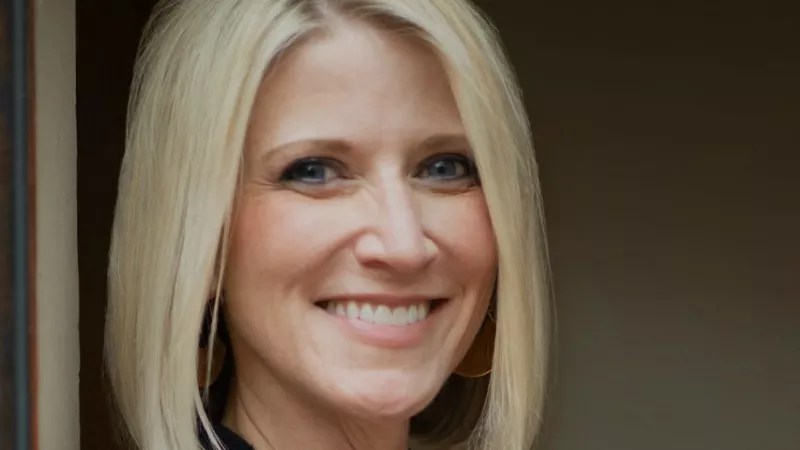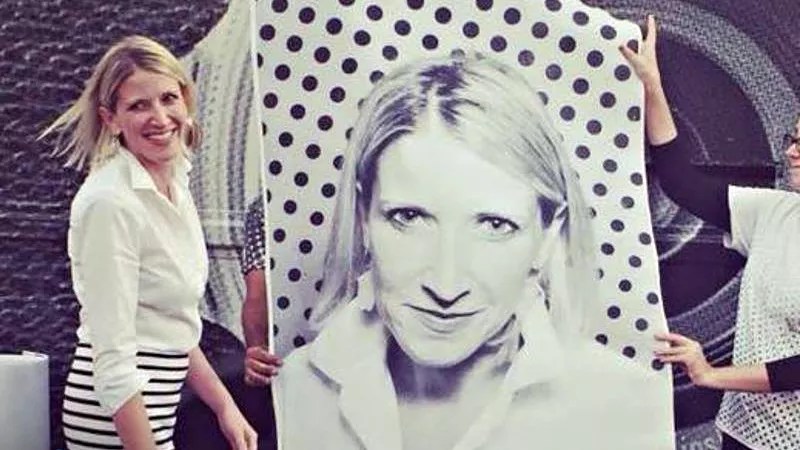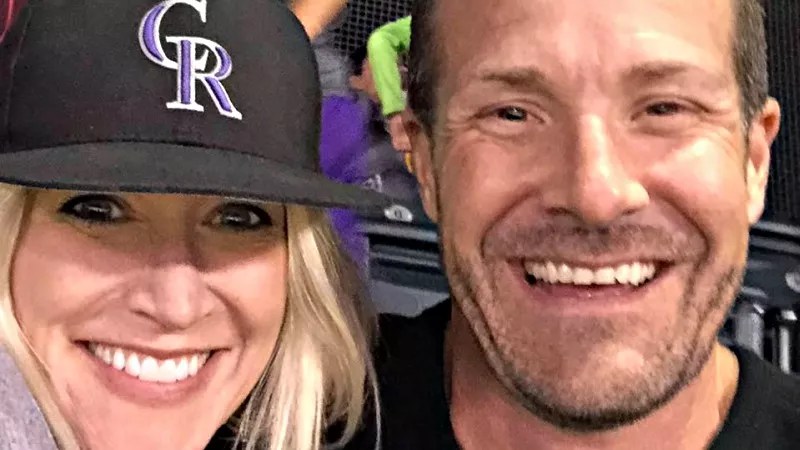

Audio By Carbonatix
At an event tonight, November 27, Jamie Giellis, the president of the River North Art District, will officially launch her campaign for mayor of Denver. She says she decided to jump into the race because she feels the best way to solve the problems facing the Mile High City is from ground level rather than 30,000 feet.
“I think the driving factor in deciding to run was really looking at this from the perspective of the work I’ve been doing throughout Denver and increasingly seeing over the last few years that neighborhoods are struggling to address challenges,” Giellis says.
In her view, “the city as a whole is struggling to address the challenges of growth. Meanwhile, we seem to have city leadership that neither has the strategy nor the ability to address the issues we have right now and to have a conversation with the community about where we’re going and what the business of the future is. It’s just getting harder and harder to do community-based work, because the city just seems to have a harder and harder time getting to ‘yes’ – getting to solutions on a number of key issues.”
Giellis, who was previously known as Jamie Licko (she got married in June), has had a widely varied professional life. But she notes that “my whole career has really been in community-based work. For more than fifteen years, I’ve really been focused on working particularly in urban neighborhoods and urban mixed-use districts. I’ve been looking at some of the challenges that come along with growth and revitalization, or I’ve worked with places that are struggling and see revitalization and really want it – looking at the fundamental issues driving it in a thoughtful way that addresses the needs of the local community.”

Jamie Giellis speaking during the 2013 Denver Art District Summit.
Open Media Foundation via YouTube
An Iowa native, Giellis points out, “My career actually started when I was in journalism. I was a reporter for a CBS station covering politics and local government issues there and really got to learn and see processes, delve into issues and tell stories around that. And in my personal experience, I watched what I saw in some cases as a pretty flawed system when it comes to the ways government was interacting with people.”
For this reason, she continues, “I decided to get out of journalism and get involved in the community side of things. My first step was more of a PR and communications role, working on some urban development issues – and that happened to lead me to an opportunity to dive in and run a downtown organization in Cedar Rapids with a business improvement district. I was 26 years old when I started leading that organization, and I found myself working very closely with the local government to try to address some pretty profound challenges there. It was trial by fire. I wasn’t trained in what I was doing, but I was leading with my heart and my passion and trying to get everybody rowing in the same direction – and we ended up having some great success in that work.” For instance, she played what she characterizes as a significant part in restructuring city government.
In 2006, Giellis moved to Denver, where she took a position at “a small consulting firm, where I worked on similar issues – and that ended up taking me all over the country for several years. I worked from Philadelphia to San Diego and a lot of interesting places in between, learning about what was happening with the reemergence of cities at the time. And I began to get concerned that the way we were revitalizing our cities was being done in a kind of top-down approach that was resulting in them beginning to lose their grit, their culture and their soul as a part of it. So in 2010, I started my own consulting company, Centro.”
Her goal with Centro “was to try to work with communities in a different way. I was particularly interested in urban neighborhoods and the small commercial districts that surrounded our city centers. I wanted to work with places in a more nuanced way as to how they evolved. But there wasn’t a lot happening in Denver then; we were just coming out of the recession, and things were moving somewhat slowly here. So I ended up doing some international work. I worked with the government in Singapore to teach officials how American cities were using different tools, like partnerships in the private sector, to really help older neighborhoods. I wrote business-improvement-district legislation for the Singapore government that was subsequently implemented across the city, and that led to me doing some work in the U.K. Big-box retail and online retailing were decimating the little town centers that had been the heart of cities and communities there, so I was asked to serve on a Parliamentary committee for the Labor Party to advise them on policies to help address that issue.”

A photo of Jamie Giellis shared as part of the Together Against Anti-Semitism campaign.
Throughout this period, Giellis commuted back and forth from Colorado, and during one of her return trips to Denver, she says, “I spoke about the role of arts and culture in some of these struggling areas. And while I was on that panel, Ginger White-Brunetti with the city’s Arts & Venues department said she’d like to see how I could help with a creative district. So I did some work with the city – analyzed all the art districts around the city and looked at how the city could help. John Hickenlooper signed some creative arts legislation and I was hired to write programming and policy in deploying the creative district certification around the state.”
In early 2014, during a period when, Giellis admits, “I had kind of gotten my fill of traveling abroad,” another local opportunity presented itself. She’d gotten to know some of the leaders in RiNo, “which was heating up very quickly – and I got pulled in to facilitate a big conversation about how we could get together and address the core concerns about development, which was already happening then. That led us to the decision to form some districts that would help support the art district and ultimately, from a stakeholder perspective, use it as a tool that would provide us with the resources and funding to fight for the character and culture of the area.”
She calls this effort “a very interesting experiment. Nobody could have stopped the market forces of development that were happening fast and furious. RiNo was kind of the last frontier of downtown, with old industrial buildings that had largely remained undeveloped. So our goal was to use everything we could to get in front of some of that development and deal with things like zoning and design. We worked on an affordability overlay and looked at how we would build infrastructure that supported mobility beyond cars and how we would work with the creative community to try to slow displacement as much as we could. We wanted to address urban issues as opposed to just letting them happen with the unbridled development we knew would come one way or the other.”
Here’s a 2016 TEDx Talk starring Giellis. It’s called “A Love Affair With Cities.”
Now, Giellis wants to bring the knowledge she gained in RiNo and beyond to Denver proper. According to her, “We need to look at how we’re going to be able to accommodate all the growth that’s come and that’s continuing to come and maintain a quality of life. I feel like our current mayor [Michael Hancock] has set a tone of, ‘We’ll respond and deal with these issues as they come,’ as opposed to proactively planning ahead and looking at how we’re going to deal with these things in a thoughtful way. It’s the kick-the-can-down-the-road mentality – like, ‘We’ll deal with that later.’ But in order to address these issues, we need to break open a conversation and work with thought leaders in the community on a variety of issues. We need to say, ‘If this is a priority, we’re going to allocate enough resources to tackle it effectively and meaningfully from a leadership perspective.’ Because I don’t think the way the city is being led right now is going to be sustainable for much longer.”
As for her top issues, she begins with “the need for affordable and accessible housing. It’s important that we not just create a pot of money and say, ‘Look, we’re building affordable housing.’ We also need to ensure pathways from all different income levels for people to get into housing. If all the young people who live here or are moving here can’t afford to get into housing with the rental rates they’re paying now, it’s going to be challenging to maintain where we’re at as a city. We need to create ways to get people in housing and keep them in their housing as we go forward.”
Also top of mind for her are matters of “transit and mobility. It’s unfortunate that we’ve been talking for five-plus years about the need for more thoughtful inter-urban, inter-city transit and have hardly made a dent in that. So we need to look at how we’re going to create a network of transit, whether that’s streetcars or better bus service or whatever seems most feasible to do alongside a connected cycle network. And we also need to address the needs of pedestrians to make it a safe environment and be thoughtful and creative about how we get more people out of cars.”
These subjects “tie into a third area, which is sustainability and the environment,” she allows. “We have to get cars off the roads and deal with some of that if we want to hit sustainability goals. And there are important things the city can be doing, like working with the private sector. Look at Brighton Boulevard, which was the first street in the City of Denver built to urban green standards. I think every project we build should be doing that. We should be sure we’re taking the opportunity with all this construction and development and infrastructure investment to do that thoughtfully and progressively.”

Jamie Giellis and husband Chris, whom she married in June.
On the subject of homelessness, she says, “It just breaks my heart watching the number of people on our streets grow and grow and watching the city do nothing about it. We have to find a compassionate way of tackling that and put enough resources behind it to support creative ways to help people get to jobs and housing and to break apart what all the needs are to really address that. It’s a complex problem, but it requires a compassionate solution to actually make progress instead of just moving people off to the next area.”
When asked about the Right to Survive Initiative that’s headed for the May 2019 ballot, Giellis says that, in her opinion, “The way it’s written right now isn’t going to solve the issue. But I have spoken with the organizers, and I get where they’re coming from. They feel like they’re not making any progress and they’re not able to have a conversation with the city, because we don’t have as a city any clearer solution or pathway to solving this problem. From their perspective, the ability to have some dignity and to be able to have some comfort while they sleep on the street is important. So I hope the initiative will start an important conversation they haven’t been able to have so far. I’ve already engaged with many of the homeless advocates because of our work with the tiny home village and other programs, and my hope is that we can work together over the course of this campaign to talk about solutions that are better than that particular option. And I’m looking forward to having those conversations.”
Likewise, Giellis wants to bring increased attention to the subject of education. “While the mayor doesn’t directly oversee Denver Public Schools or the education system, the mayor can have some influence on making sure we’re putting kids in quality schools,” she says.
Whatever the issue, she wants to take what she calls “a neighborhood-led approach. The neighborhoods have been, to a large extent, very shut off. Even the neighborhood planning effort the city has embarked on is going to take fifteen to twenty years to complete, and I don’t know that the neighborhoods have that much time. I’ve gotten calls from many neighborhoods over the past few years from people who were very curious about how RiNo has achieved some of the things it has. That’s why we need to empower neighborhoods with a toolbox to address their specific issues. Maybe a commercial strip is being taken over by residential construction. Maybe there are problems with safety. Whatever the issues are, I think we need to find a more nuanced way to address them. Ultimately, the stronger our neighborhoods are, the stronger our city is. I think that should be the core philosophy of how we go about implementing things.”

Jamie Giellis talking about her mayoral campaign on 9News.
9News via YouTube
Given the changes in RiNo, political opponents of Giellis will likely try to make her the poster child for gentrification. She feels such criticism is both suspect and superficial.
“It’s unfortunate that the RiNo story often gets seen in the context of gentrification,” she argues. “The truth is, the district didn’t really have a strong residential fabric. It was partially large industrial and more the character of Larimer Street, with those small-business storefronts. To a large extent, it’s a district that has risen up surrounded by those neighborhoods and brought with it a mixed-use community. And we did everything in our control to at least direct what that development would look like and address issues of displacement. That’s very hard to do in a strong market like we have right now, and it’s particularly hard to do when you have a city that moves slowly and doesn’t always put itself in a place to proactively address those issues but only responds to them. As a neighborhood district, it’s like pushing a boulder uphill to fight that fight and make a case, as opposed to the city saying, ‘We get the stress of what’s happening, and we really need to address it.'”
She adds: “My record shows that I’ve been actively involved in addressing density, design and affordability issues, and in engaging with the homeless community. I advocated for the first tiny home village to be built in RiNo. We have unemployed individuals do our maintenance work in RiNo. We’ve invested hundreds of thousands in the artist community, and we’ve done the best we can to make sure infrastructure is thoughtfully designed and included bike lanes and pedestrian areas and community space as part of future parks development. And I certainly haven’t done a lot to directly support development, as I’ve been accused of doing. We’ve done our best to shape development, and we haven’t always succeeded. But that’s only part of the battle. Certainly, it’s not about gentrifying neighborhoods. It’s about empowering communities – and only the community knows what’s best for it.”
To Giellis, “The time is now to have a very important conversation about the future of Denver.”
The launch party for Jamie Giellis’s mayoral campaign will take place from 6 to 8 p.m. on Tuesday, November 27, at 1321 South Broadway. Click for more details.